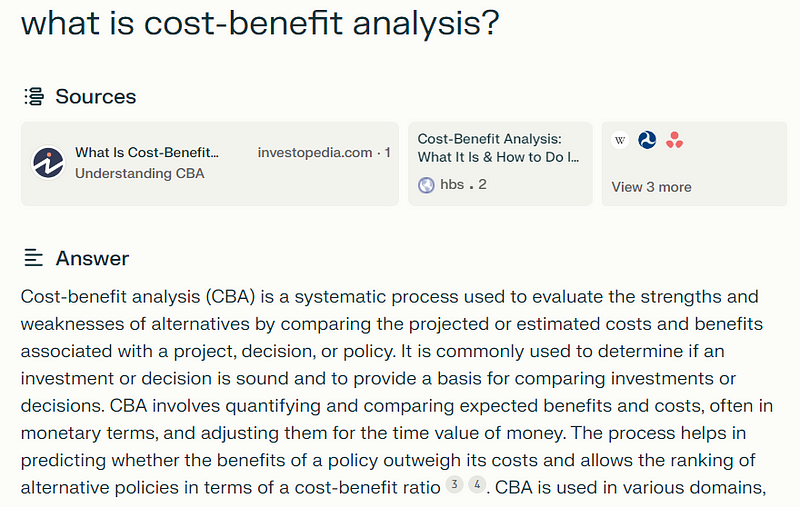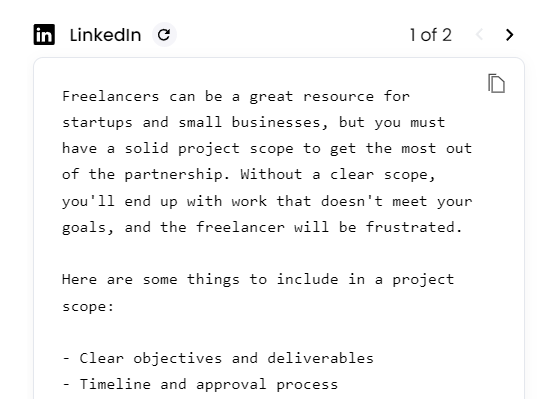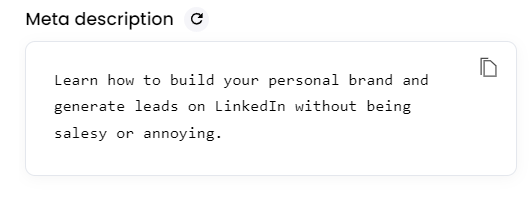Let AI Make the Boring Parts of Writing Production More Efficient
How to use AI tools to complement your writing process.

A marketer I know referred to his team as “quality absolutists.” I instantly loved that term because it’s how I feel about my work as a writer. Relentless commitment to quality — and therefore skeptical of the promises of generative AI.
That being said, I am intrigued by AI use cases that can speed up parts of the writing process. I’ve found a few small ways to incorporate AI into my work. The output is still all me, but I think of AI as a handy assistant (and one that needs a lot of supervision!)
Here are some ways generative AI can be helpful for fellow quality absolutists.
Research assistance (avoiding Google)
Google’s search results have become a complete cesspool. I’m not getting the best results — I’m getting results with the best SEO. After scrolling past the ads, I’ll click into article after article, irritated by the lack of useful information.
Sure, I could go to ChatGPT with my search. But I don’t trust the results due to AI hallucinations. I know from firsthand experience that if ChatGPT doesn’t know the answer, it’ll make something up. I have to independently verify what ChatGPT tells me, so it’s not a time saver.
However, Perplexity.ai cuts through the noise of Google and provides citations.
I had to write an article for a client about “cost-benefit analysis.” In a pre-Perplexity world, I’d have started with Google. Instead, I started with Perplexity and got a nice summary.

I can see that one of the results is from Harvard Business School online, so I’d probably click to read more. I can also click on any citations to read a specific article. Perplexity also suggests additional searches, such as “What are the limitations of cost-benefit analysis?” to dive further into the topic. You can also limit your Perplexity searches to certain sources, such as academic journals, Reddit posts, or YouTube videos.
Compared to Google, Perplexity is a much better search experience for the type of work I do.
Connecting ideas within my own writing
I’ve been writing online for years, with hundreds of thousands of published words across several sites. I’d love to be able to surface related ideas within my own notes.
A lot of note-taking apps rely on proper categorization. You add tags or hashtags to find related ideas — which is hugely prone to human error. AI can do a better job by finding related ideas based simply on the content itself.
This type of AI is emerging. Notion has announced its version, a Q&A chatbot that searches your Notion docs. Google’s Notebook LM allows you to connect your Google docs in a personalized AI (though I find connecting sources to be very clunky).
Personally, I use an app called Reflect for my note-taking, research, and drafting. One of the best features is showing me related notes while I’m writing — without any prompting from me. Here’s an example as I was writing this article:

Based only on my draft, Reflect found three related articles I wrote (two have been published in The Writing Cooperative!). These become easy opportunities to link to my other published work.
And since I keep notes about articles I read online, Reflect would also surface those. Here’s an example from an article I was drafting about remote work. Reflect found my notes from related articles.

Repurpose long-form content into social posts
Because I write so much online, I’m sitting on a treasure trove of social posts. But I have to take the time to turn my long-form content into something suitable for LinkedIn or Threads (I’ve abandoned X/Twitter).
Yes, writing a social post based on an article is easier than writing something from scratch. But it still requires brain energy to sift through the article. AI can do this faster, pulling out the best ideas in the form of a social post.
ChatGPT could do this with a good prompt. You could feed it your entire article and ask it to chop the article up into a social post appropriate for a specific platform.
I use an app called Writer. As an actual product (versus a chatbot) it’s a lot easier to use. I’ll drop in my article draft and use a “Highlights” feature to generate social posts.
Here are the Writer results for a LinkedIn post based on a recent article I wrote:

Of course, I’ll edit this before publishing it because it doesn’t sound like me. However, the idea is already there, and tweaking the output is a pretty quick process.
Generate meta descriptions
Another element of writing that simply takes time: creating a meta description. Like generating a social post, I’ve already done the hard work. Now I need something to appease the Google robots.
I also use Writer for this, since it has a meta description generator. ChatGPT would also work. Here’s what it generated for a recent Medium article I wrote about LinkedIn.

Some generative AI platforms, such as Frase or Copy.ai, are specifically geared toward SEO. If you’re doing that type of writing, you might want to check out those platforms.

AI is a complement, not a replacement
There are other ways you can use AI to complement your writing. I use Midjourney to generate AI images for my published articles, rather than selecting a stock photo. If you do anything with audio or video, you can use AI to chop a long-form recording into shorter snippets.
In each of these instances, you’ve already done the creative work. You’ve written something or produced something unique and original — something human. AI is simply helping you re-format or repurpose it for various audiences and platforms.
Full-blown generative AI, such as writing an entire article, creates a lot of noise and garbage on the internet. No amount of editing can replace the human experience of good writing. My crystal ball leads me to believe that quality writing will stand out even more in a world of generative AI.
But I’m also a productivity nerd. I’m constantly looking for ways to be more efficient. If AI can speed up certain steps — without sacrificing quality — then I’ll gladly add it to my process.
Check out my free guide: Manage Your Time + Content Across Multiple Platforms.






